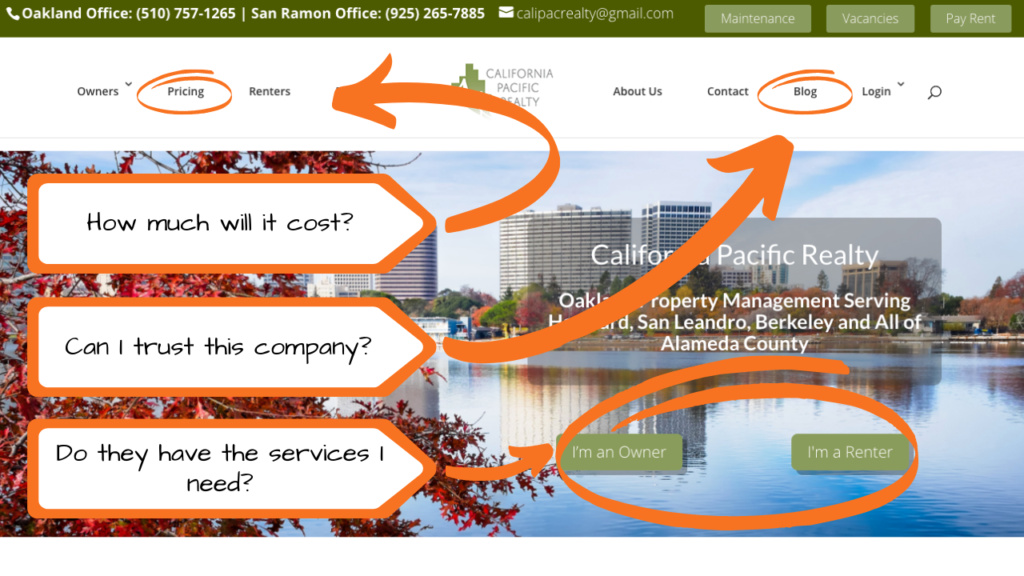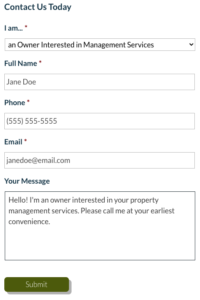
What makes a property management website truly stand out from the rest?
Two years ago we wrote a brief overview of key elements needed for a stand-out property management website.
Today, join us for a deep dive into the four (4) elements we consider to be key to developing a great property management website. Get ready to take notes! We’re covering everything from how to make your site user-friendly, to website accessibility, to the best SEO practices.
1. Provide a Stellar User Experience
 You might have a beautifully-designed website, but that doesn’t guarantee that your visitors can navigate it easily and get answers to their questions.
You might have a beautifully-designed website, but that doesn’t guarantee that your visitors can navigate it easily and get answers to their questions.
By visitors, we mean owners and tenants. They shouldn’t have to struggle to figure out where to pay rent online, or find out how much your property management services cost. Professional design is important, but it’s equally important that owners and tenants wanting to work with you can find exactly what they need.
You can use videos and images to illustrate what it would be like to work with you. Visual examples help support the information you’re giving in your copy, make it easier to quickly scan a page, and develop a sense of trust.
Website Accessibility
As you consider user experience, make sure your website is accessible. This includes adding alt text to all of your images and using accessible colour schemes. Ensuring accessibility will take time and research, but it’s well-worth it. Your information will be available to wider reach of audiences, and you’ll be protecting yourself against Fair Housing lawsuits. For more information, check out our website accessibility blog, or listen to our interview with web accessibility expert and lawyer, Kris Rivenburgh.
2. Does Your Website Content Answer The Most Important Questions?
As you create your website copy, keep your audience in mind. You may think that what you’re writing sounds good, but it might not be clear for property owners, investors or potential tenants.
What You Need to Communicate to Owners
There are three questions that you need to efficiently and clearly answer on your website when a prospective owner client arrives on your homepage:
- Does this company have the property management services that I need?
- How much will it cost me to do business with this company?
- Can I really trust this company with my property or properties?

The answers to these questions don’t necessarily need to be on the homepage itself, but it should be obvious where your owner needs to go in order to get them. Your copy should be easy to read, your pages should have clear navigation, and your information should be well organised.
Feel free to use photos to support the copy (as long as they include alt text!), but make sure they’re not communication critical information — that should remain in the copy itself.
3. SEO is an On-Going Process
Improving your Search Engine Optimization, or SEO, means you are creating relevant content on a regular basis that establishes your company as a trustworthy source of information. When Google crawls your website, you want them to consider you the expert in your area, so that you will rank high on search engines when owners and tenants are searching for your services.
Relevant, Regular Content is the Best Content
Google wants to connect searchers with the most relevant, up-to-date information. To do that, Google updates their ranking algorithm regularly, and you don’t want to be left behind.
Focus on creating fresh content that meets the needs of all of your users. That doesn’t mean you have to do a full website redesign all the time – but reviewing your website on a regular basis and finding ways to improve your design and the relevancy of your content is a good way of boosting your SEO and making your company look like the expert Google wants to put in front of its users.
Blogs are a great way of regularly adding relevant content. Do some Googling yourself and find out what questions your potential owner leads are searching for, and then use those as a jumping-off place for blog ideas. You’ll build trust with owners in the community who will see you as the go-to for property management solutions in your area.
No Such Thing as an SEO Shortcut
 Moving up your ranking on a search results page takes time, expertise and regular updates of content. There is no “shortcut” when it comes to SEO. But don’t despair! With research, time and effort, you can steadily improve your website’s SEO.
Moving up your ranking on a search results page takes time, expertise and regular updates of content. There is no “shortcut” when it comes to SEO. But don’t despair! With research, time and effort, you can steadily improve your website’s SEO.
Or, you can always give Fourandhalf a call, and ask us to take this off your plate!
4. Your Website Should Be Converting Owner Leads
Perhaps the number one takeaway from this blog should be this: Is your website converting owner leads? Consider the return on investment of your website. If you’re going to spend money designing, building and launching your website, what are you getting in return?
Tracking Website Conversions
The way you determine that “return” is by tracking how many visitors to your site are being converted into leads. One very simple way to track this is through webform submissions. Do you know how many form submissions you receive through your website every month? If you don’t know, now is a great time to start.
When you track your conversions, be sure to track whether a form submission is from an owner or a tenant, and note what type of lead they are (more on that below). Knowing that you received 100 form submissions last month doesn’t help you understand your website ROI, unless you know that 75 of them were owner leads. Now you can really start to measure how your website is growing your business.
With your webform tracking system in place, give yourself 6 months to collect data. After that, schedule some time where you will look at your numbers and evaluate how well your website is converting leads, and if there are any improvements you can make.
Not All Leads Are Equal
 A lead is just a name with an email or phone number.
A lead is just a name with an email or phone number.
Naturally, this means that some leads are more valid than others.
As you’re tracking website form submissions, decide how you’re going to qualify each lead that comes in, and how (or if) you will nurture them. In our interview with Jeremy Pound, he suggested using terms like “marketing-qualified lead” (someone interested in your content but no t ready to be sold to) and “sales-qualified lead” (someone ready to do business with you). You can listen to the full interview here.
How Many Owner Leads Should You Get From Your Website?
The answer to this question is going to depend on a variety of contributing factors, such as who your target owners are, how competitive your area is, and how well your website is currently ranking.
Instead of thinking about how many you should be getting, first determine how many you’re currently getting.
From there, you can create a plan to improve your numbers. Be patient, and remember that this is a process. You may need to experiment with a few different tactics before you find something that catches the attention of your ideal clients.
If you need a hand, we’re here to help. We have years of experience assisting property managers with their websites and their marketing strategies as a whole.
Conclusion
The final takeaway is this: your website should be bringing in business. Period.
User experience, content, SEO and lead conversion are all critical parts of creating a great property management website. Try not to get hyper-focused on just one of these elements.
Ranking number one on Google is only beneficial if all of the other elements are also intact.
Consider this: would you rather have a non-converting website that is ranked number one on Google, or a website that actually helps you grow your business?
You be the judge.
If you’re ready to level up to a great property management website that will get a better return on investment, contact us. We’ll not only take a look at your website, but chat with you about your marketing plan as a whole.
Let’s get you to where you want to be.
This post was originally published on October 24, 2018 and updated on July 23, 2020.
